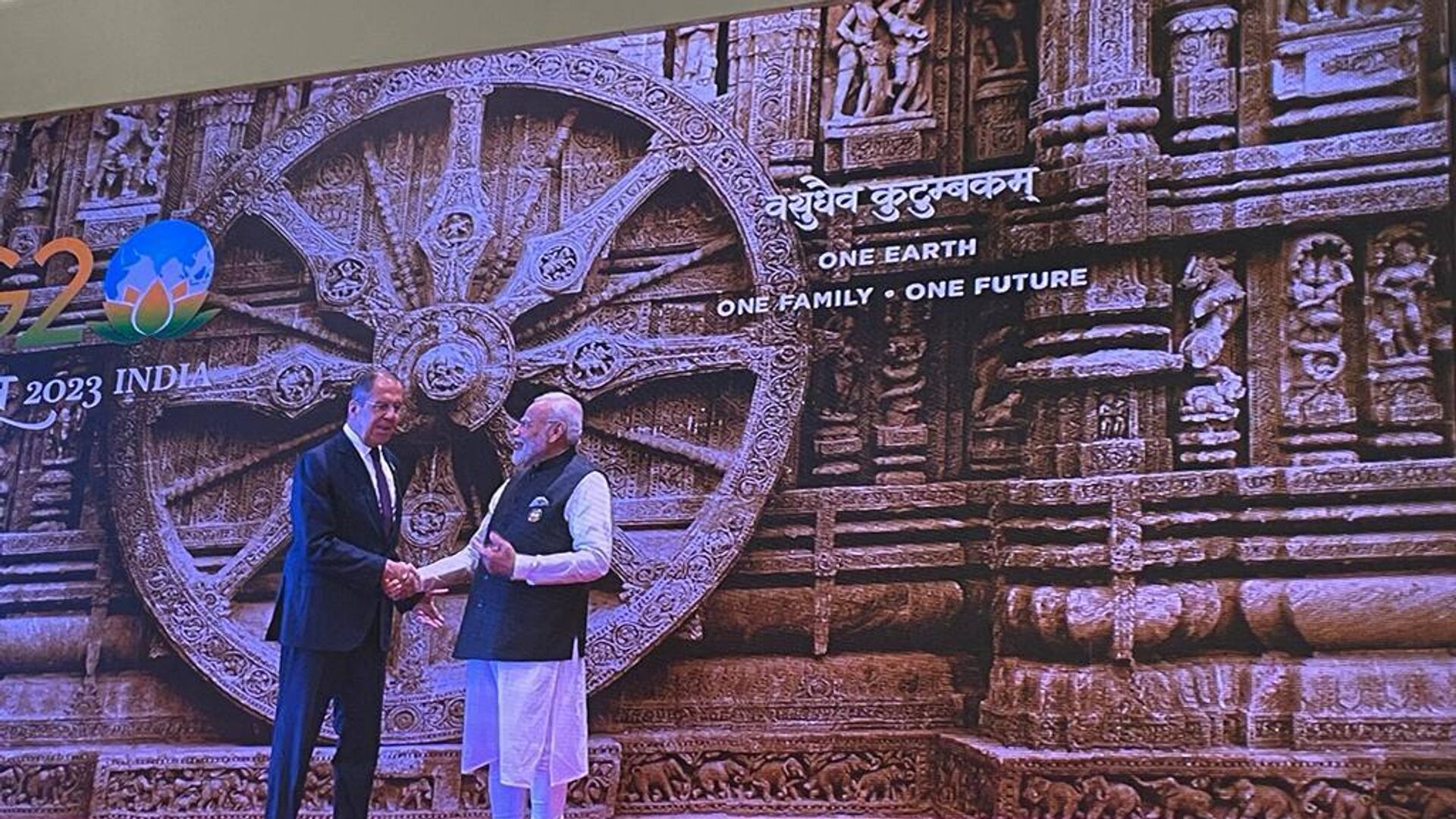https://sputnikglobe.com/20230910/g20s-ukraine-fatigue-signals-global-souths-knocking-at-western-dominated-orders-door-1113260445.html
G20’s ‘Ukraine Fatigue’ Signals Global South’s Knocking at Western-Dominated Order’s Door
G20’s ‘Ukraine Fatigue’ Signals Global South’s Knocking at Western-Dominated Order’s Door
Sputnik International
The two-day meeting of G20 leaders wrapped up in New Delhi on Sunday, with Western powers failing to “Ukrainianize” the agenda, and a number of pledges made aimed at increasing the Global South’s voice in world affairs. Sputnik reached out to international affairs experts to get a sense of the summit’s impact on the shifting world order.
2023-09-10T17:08+0000
2023-09-10T17:08+0000
2023-09-10T17:21+0000
analysis
russia
ukraine
brazil
sergey lavrov
volodymyr zelensky
joe biden
g20
european union (eu)
international monetary fund
https://cdn1.img.sputnikglobe.com/img/07e7/09/09/1113222382_0:17:1024:593_1920x0_80_0_0_f1655b70ae99a7fdc7a2efa99fba8919.jpg
The G20 is being transformed from within by members from the Global South, with the West failing to hijack the intergovernmental forum’s agenda to focus on the Ukraine crisis, Russian Foreign Minister Sergey Lavrov has said.Lavrov suggested that Global South countries are “no longer willing to be lectured” on the subject, and “don’t want don’t want to hear anything about forcing Russia to comply with the Zelensky formula.” US and EU-led efforts to foist their approach to Ukraine onto the rest of the world are “disrespectful,” an expression of “neocolonialism from Western countries” that “have failed this time,” he said.Characterizing the summit as an “unqualified success” and a genuine turning point away from a Western-dominated world order, the Russian top diplomat hailed the Indian presidency’s ability to “coalesce G20 members from the Global South” in the pursuit of their interests, and promised that Russia would play its part in “strengthening these positive trends” during the upcoming Brazilian and South African presidencies of the G20 in the coming two years.Lavrov also touched on the declaration’s inclusion of important concrete objectives, like reforming traditionally Western-dominated institutions such as the International Monetary Fund and the World Bank, and the need for the US and its allies to fulfill the obligations and promises made to the Global South, like technology transfers and financial support.“Developing countries will no longer accept being presented with the false choice of either fighting poverty or investing resources [to fight] climate change. This is a false alternative,” Lavrov stressed.Blow to the West“So I agree completely with the sentiments that were expressed by, amongst others, the president of Brazil. And I do think it's important that we get peace and it's important for the Ukrainian people, it's important for the Russian people, but also it's important for world peace that we resolve these matters through negotiation…But I think it was important that the G20 was not used as a multilateral tool to have a one-sided perspective on the Ukrainian matter,” the observer said.Dr. Surve agreed with Lavrov’s sentiments on the shifting balance of power inside the G20, pointing, for example, to the African Union’s acceptance as a permanent member of the bloc, and suggesting that it was the recent BRICS summit in Johannesburg which “unquestionably sent out a signal that there is a multipolar world emerging,” forcing “a rethink” and “a review or reassessment” inside the G20 about its composition.“So yes, there’s no question that there is a shift, and the influence of the Global South has had an impact on both the composition [and] also the agenda and the outcomes of the G20 meeting,” the observer stressed.For too long, Dr. Surve said, the G20 has essentially “ignored the needs of the developing world.” The fact that the past two of its summits have been held in Indonesia and India, and the next two will take place in Brazil and South Africa, will allow developing countries to get more of a fair shake from the intergovernmental forum and force it to take the developing world’s needs and interests more seriously. “I think the membership of the African Union representing Africa as one of the economic and political blocs similarly to the European Union is a very significant step in that regard.”Surve also agreed that the need for a reform of multilateral institutions is “long overdue.”India Flexes Diplomatic MusclesDr. Suranjali Tandon, an assistant professor specializing in international taxation and sustainable finance from the Delhi-based National Institute of Public Finance and Policy, told Sputnik about the important, “inclusive” role played by India and Prime Minister Narendra Modi in addressing the Global South’s longstanding demands at the G20.“It’s abundantly clear that in order to meet any of the challenges such as climate change, global tax reform or even cryptocurrencies, developing countries will have to be in agreement. This is because developing countries now account for a large share of the global markets including that of commodities. More than a year of sanctions has also proven that developed countries cannot coerce countries to comply,” she stressed.
https://sputnikglobe.com/20230910/lavrov-at-g20-americans-want-to-strategically-defeat-russia-1113254737.html
https://sputnikglobe.com/20230910/g20-proposed-wto-reform-poses-huge-challenges-for-divided-world-1113243701.html
https://sputnikglobe.com/20230903/enlargement-of-brics-to-contribute-to-fairer-global-governance---south-african-president-1113097675.html
https://sputnikglobe.com/20230824/brics-expansion-main-catalyst-of-new-world-order-marked-by-end-of-petrodollar-1112847948.html
russia
ukraine
brazil
Sputnik International
feedback@sputniknews.com
+74956456601
MIA „Rossiya Segodnya“
2023
News
en_EN
Sputnik International
feedback@sputniknews.com
+74956456601
MIA „Rossiya Segodnya“
Sputnik International
feedback@sputniknews.com
+74956456601
MIA „Rossiya Segodnya“
g20, summit, russia, lavrov, ukraine, united states, europe, india, new delhi, global south, new world order, balance of power
g20, summit, russia, lavrov, ukraine, united states, europe, india, new delhi, global south, new world order, balance of power
G20’s ‘Ukraine Fatigue’ Signals Global South’s Knocking at Western-Dominated Order’s Door
17:08 GMT 10.09.2023 (Updated: 17:21 GMT 10.09.2023) The two-day meeting of G20 leaders wrapped up in New Delhi on Sunday, with Western powers failing to “Ukrainianize” the agenda, and a number of pledges made aimed at increasing the Global South’s voice in world affairs. Sputnik reached out to international affairs experts to get a sense of the summit’s impact on the shifting world order.
The G20 is being transformed from within by members from the
Global South, with the West failing to hijack the intergovernmental forum’s agenda to focus on the Ukraine crisis, Russian Foreign Minister Sergey Lavrov has said.
“Largely due to such a consolidated position of the Global South in defense of its legitimate interests, it was possible to prevent the West’s attempt to ‘Ukrainianize’ the agenda, to the detriment of the discussion of urgent tasks of developing countries,” Lavrov, who represented Russia at the New Delhi summit, told reporters in a
press conference Sunday.
Lavrov suggested that Global South countries are “no longer willing to be lectured” on the subject, and “don’t want don’t want to hear anything about forcing Russia to comply with the Zelensky formula.” US and EU-led efforts to foist their approach to Ukraine onto the rest of the world are “disrespectful,” an expression of “neocolonialism from Western countries” that “have failed this time,” he said.
Characterizing the summit as an “unqualified success” and a genuine turning point away from a Western-dominated world order, the Russian top diplomat hailed the Indian presidency’s ability to “coalesce G20 members from the Global South” in the pursuit of their interests, and promised that Russia would play its part in “strengthening these positive trends” during the upcoming Brazilian and South African presidencies of the G20 in the coming two years.
“I think that a healthy solution has been found in the declaration regarding the need to strive for a clear and equitable balance of interests,” Lavrov said. The path ahead will be long and difficult, but the summit was a “turning point in terms of a clear focus on precisely such tasks,” he said.
Lavrov also touched on the
declaration’s inclusion of important concrete objectives, like reforming traditionally Western-dominated institutions such as the International Monetary Fund and the World Bank, and the need for the US and its allies to fulfill the obligations and promises made to the Global South, like technology transfers and financial support.
“Developing countries will no longer accept being presented with the false choice of either fighting poverty or investing resources [to fight] climate change. This is a false alternative,” Lavrov stressed.
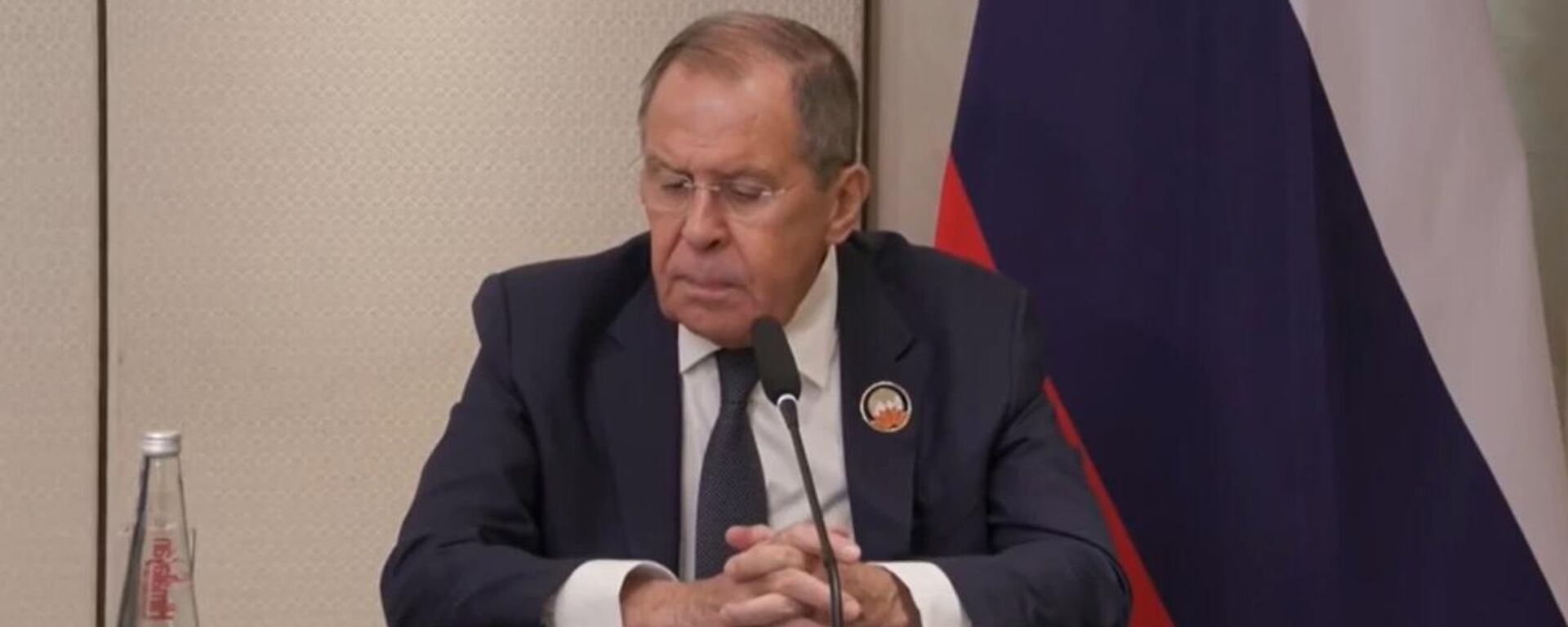
10 September 2023, 13:09 GMT
“I think it’s fair to say that the West and in particular President Biden and the European Union would have wanted a stronger statement [on] Ukraine – that did not emerge at the G20 meeting. Instead, what happened was that there was a general view that there should be peace. And in fact, President Lula of Brazil was quite fatigued when he said that the G20 is not a place to discuss the Ukraine-Russia situation, that should be, in fact, discussed at the United Nations,” Dr. Iqbal Surve, a former BRICS Business Council chairman who played an instrumental in the creation of the BRICS’ New Development Bank, told Sputnik.
“So I agree completely with the sentiments that were expressed by, amongst others, the president of Brazil. And I do think it's important that we get peace and it's important for the Ukrainian people, it's important for the Russian people, but also it's important for world peace that we resolve these matters through negotiation…But I think it was important that the G20 was not used as a multilateral tool to have a one-sided perspective on the Ukrainian matter,” the observer said.
Dr. Surve agreed with Lavrov’s sentiments on the shifting balance of power inside the G20, pointing, for example, to the African Union’s acceptance as a permanent member of the bloc, and suggesting that it was the recent BRICS summit in Johannesburg which “unquestionably sent out a signal that there is a multipolar world emerging,” forcing “a rethink” and “a review or reassessment” inside the G20 about its composition.
“So yes, there’s no question that there is a shift, and the influence of the Global South has had an impact on both the composition [and] also the agenda and the outcomes of the G20 meeting,” the observer stressed.
“The chessboard in global politics has changed. And multilateral organizations no longer have a worldview which is essentially unipolar,” Surve noted.
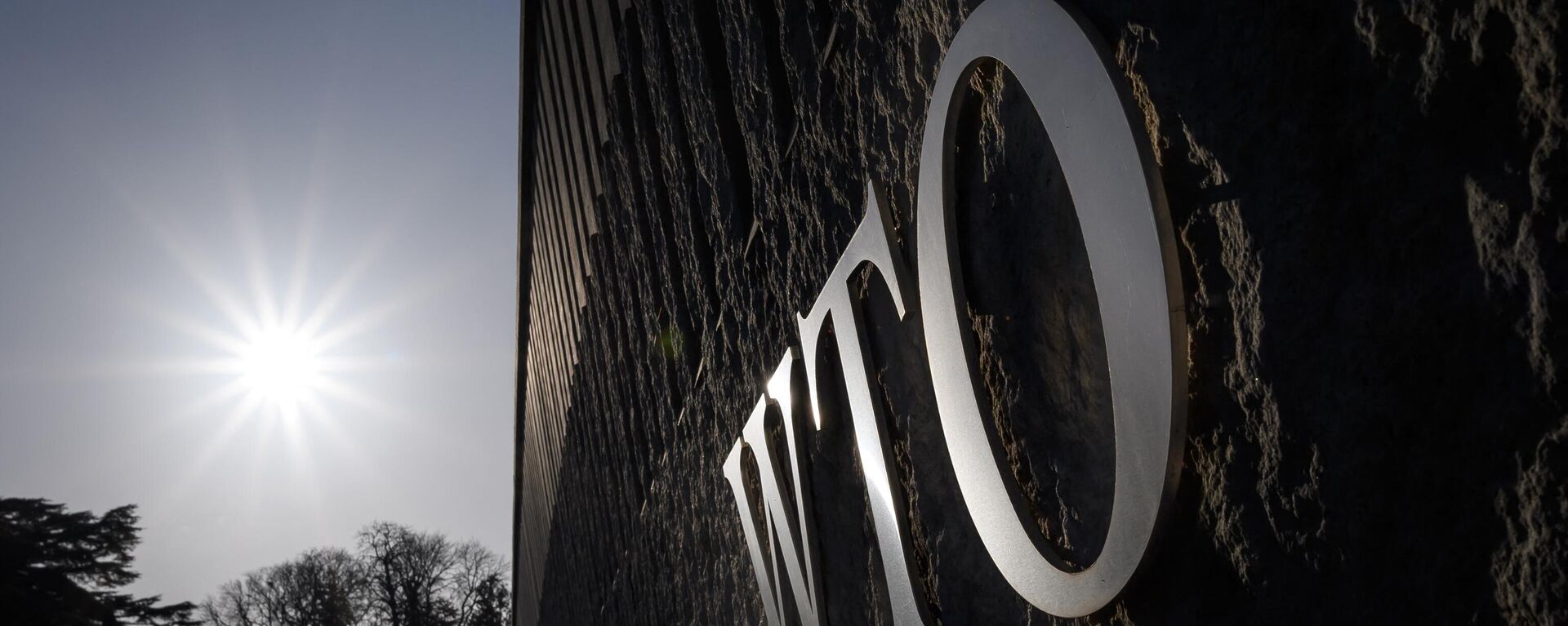
10 September 2023, 08:55 GMT
For too long, Dr. Surve said, the G20 has essentially “ignored the needs of the developing world.” The fact that the past two of its summits have been held in Indonesia and India, and the next two will take place in Brazil and South Africa, will allow developing countries to get more of a fair shake from the intergovernmental forum and force it to take the developing world’s needs and interests more seriously. “I think the membership of the African Union representing Africa as one of the economic and political blocs similarly to the European Union is a very significant step in that regard.”
Surve also agreed that the need for a reform of multilateral institutions is “long overdue.”
“Whether we are talking about, you know, the United Nations, whether we are talking about the G20, whether we are talking about the World Bank, the IMF, organs of the United Nations themselves. The world has changed. I mean, the world population has changed. The majority of the world population now lives in developing countries. Economies of the world have changed. If you take the BRICS Plus grouping, it's more than 37% of the global economy, which is greater than the G7, for example. So you cannot have the same system or the same institutions with the same structures and format, which you had, you know, since the establishment of the United Nations. The world has changed fundamentally,” he said.
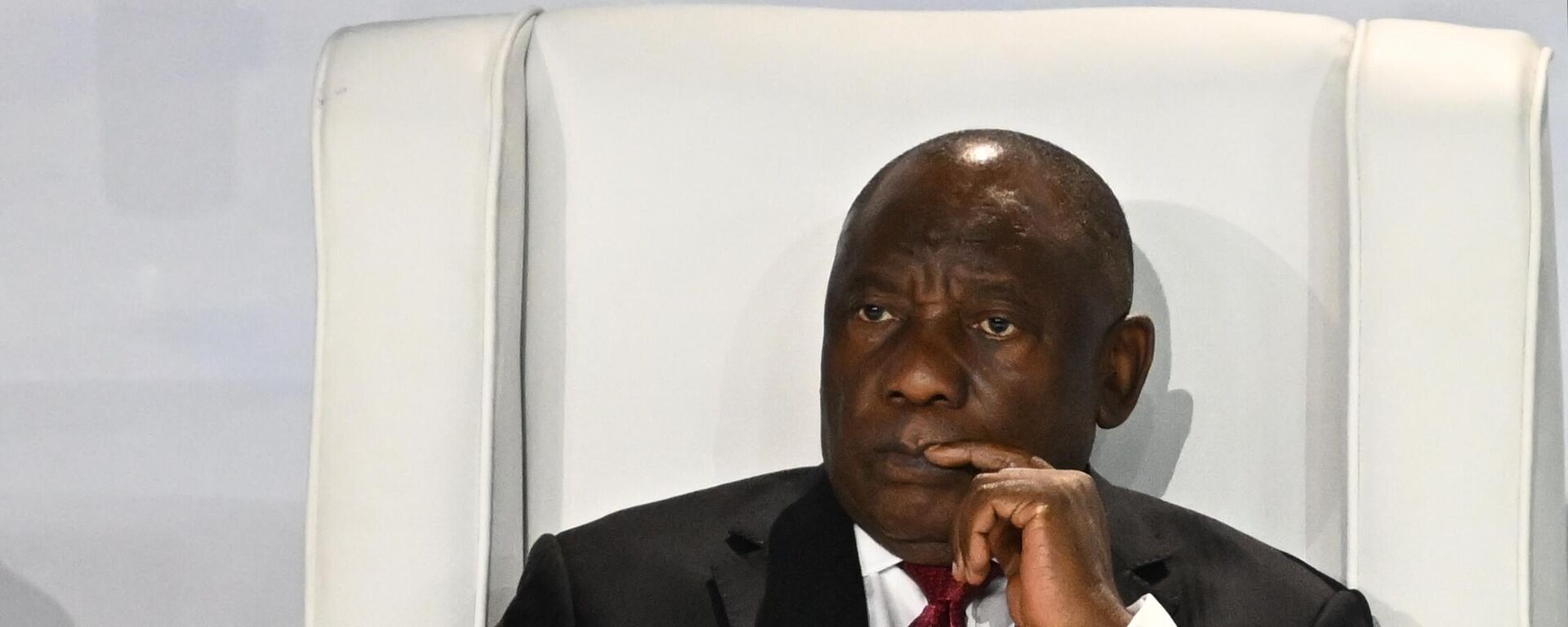
3 September 2023, 22:34 GMT
India Flexes Diplomatic Muscles
Dr. Suranjali Tandon, an assistant professor specializing in international taxation and sustainable finance from the Delhi-based National Institute of Public Finance and Policy, told Sputnik about the important, “inclusive” role played by India and Prime Minister Narendra Modi in addressing the Global South’s longstanding demands at the G20.
“These include debt restructuring of developing countries, reform of global financial architecture, particularly the multilateral development banks, and [ensuring an] increase in concessional capital to these countries. A significant move to strengthen the voice of developing countries was the inclusion of the African Union as a permanent G20 member. With the G20 presidency passing on to Brazil and then South Africa, it is hoped that a multipolar world order may truly be emerging,” Tandon said.
“It’s abundantly clear that in order to meet any of the challenges such as climate change, global tax reform or even cryptocurrencies, developing countries will have to be in agreement. This is because developing countries now account for a large share of the global markets including that of commodities. More than a year of sanctions has also proven that developed countries cannot coerce countries to comply,” she stressed.
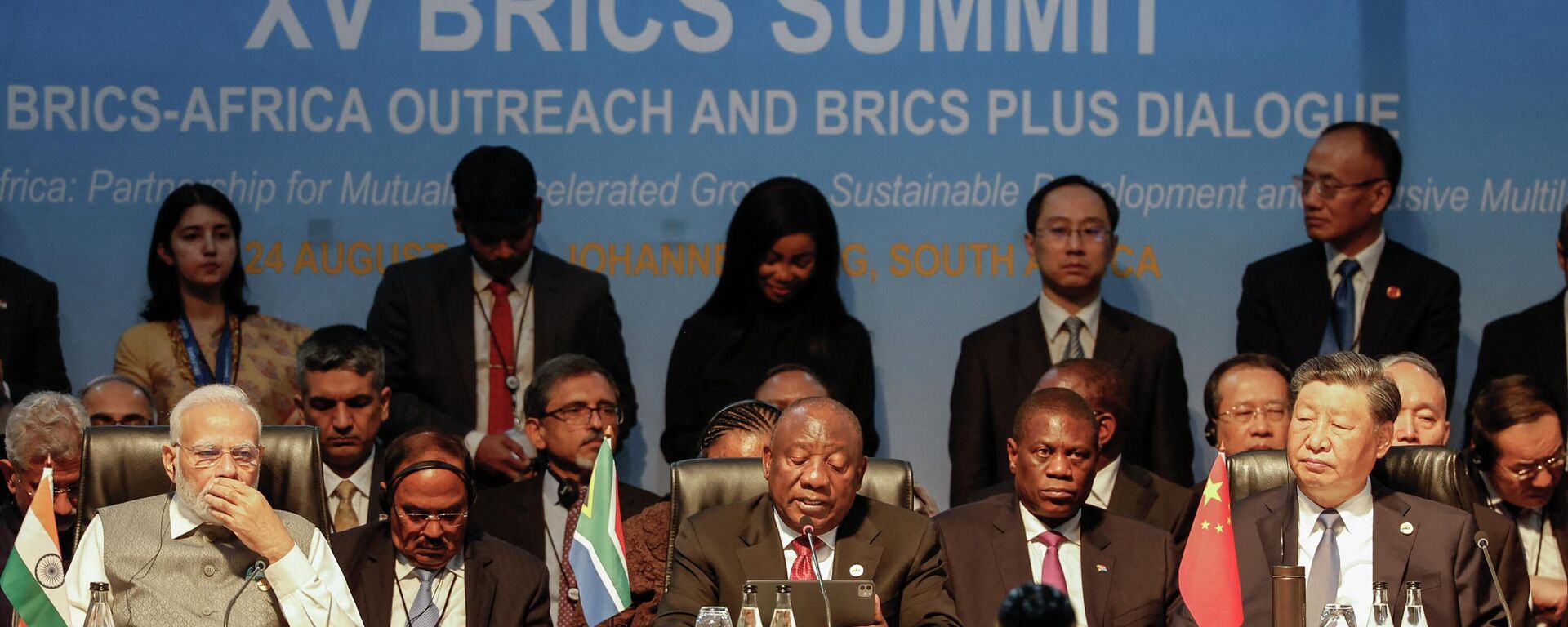
24 August 2023, 11:45 GMT
